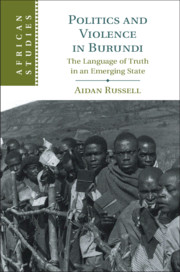Book contents
- Politics and Violence in Burundi
- African Studies Series
- Politics and Violence in Burundi
- Copyright page
- Contents
- Figures and Maps
- Acknowledgements
- Linguistic and Orthographic Note
- Glossary of Terms
- List of Abbreviations
- Introduction
- Prologue, 1796–1959
- Part I 1959–1961: ‘To See the Son of a King’
- Part II 1961–1967: ‘A Most Total Anarchy’
- Part III 1968–1972: ‘Please Send Me a Car to Take Them Away’
- Conclusion
- Bibliography
- Index
- African Studies Series
Conclusion
The Court of Baribuka
Published online by Cambridge University Press: 03 October 2019
- Politics and Violence in Burundi
- African Studies Series
- Politics and Violence in Burundi
- Copyright page
- Contents
- Figures and Maps
- Acknowledgements
- Linguistic and Orthographic Note
- Glossary of Terms
- List of Abbreviations
- Introduction
- Prologue, 1796–1959
- Part I 1959–1961: ‘To See the Son of a King’
- Part II 1961–1967: ‘A Most Total Anarchy’
- Part III 1968–1972: ‘Please Send Me a Car to Take Them Away’
- Conclusion
- Bibliography
- Index
- African Studies Series
Summary
The conclusion reflects on the narration of Burundi’s history as a date-list of catastrophes, and the need for attention to the processes and possibilities in between. It argues that the full account of decolonisation as a time of uncertainty and possibility must be seen in the interaction of state actors and local populations. It reviews the idea of the ‘realisation’ of the postcolony among the general population as the experience of solving a riddle, in which the process of solving it is as important as the answer. The languages and attempts at different modes of citizenship and engagement throughout the 1960s would continue to form part of the strategies of living with the postcolonial state in decades to come. Returning to several proverbs reported during the violence in 1972, finally, the conclusion relates these questions of truth to issues of memory, and observes their significance for continuing processes of reconciliation, justice, community cohesion and history-writing. The conviction of personal memory and the ambiguity of public modes of truth-speaking continue to demonstrate the centrality of ideas of truth in contemporary practices of politics.
- Type
- Chapter
- Information
- Politics and Violence in BurundiThe Language of Truth in an Emerging State, pp. 270 - 279Publisher: Cambridge University PressPrint publication year: 2019

